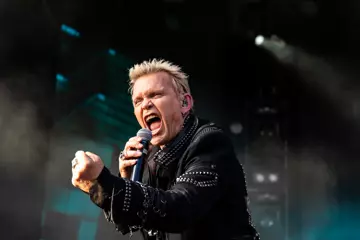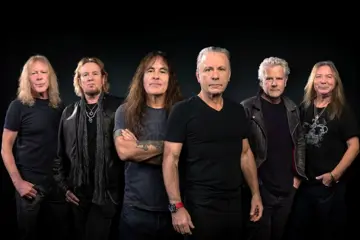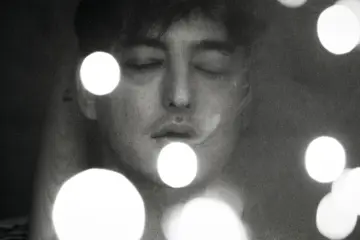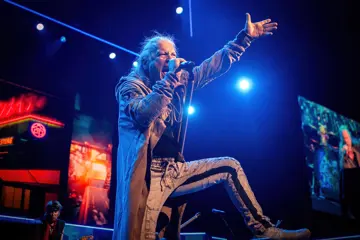At the time of Gethin Anthony's character Renly Baratheon's untimely death midway through Game Of Thrones season two (come on, if you haven't watched it by now, you obviously don't care), the series was averaging close to four million US viewers per episode and thriving. It propelled Anthony into the spotlight and when the opportunity came to star as US criminal and cult leader Charles Manson in new TV series Aquarius, he jumped at the chance, although he was admittedly taken aback. "I got sent a script and my wonderful representatives were like, 'I think you're gonna like this!' I was doing theatre in London and I was on my way to rehearsals and I kind of read the script on the train and then was like, 'Oh, whoa, I need to read this properly!'" He laughs. "I got home and read it again and I was just really struck by it. I kind of thought, 'Who's going to be stupid enough to try and play Charles Manson?'"
"I kind of thought, 'Who's going to be stupid enough to try and play Charles Manson?'"
While plenty has been documented about Manson around the time and after he and the members of his "family" were convicted of several chilling murders, Aquarius takes place prior to the spree, focusing on Sam Hodiak (David Duchovny), a homicide detective who goes undercover to track Manson and the "family". As such, Anthony, who wasn't born until close to two decades later, was given plenty of homework. "The basics were there — biographies I could read, which I did — especially stuff about his life before 1967; where he grew up, what his relationships were like with people, that was really important. Then there was the side of it — watching videotapes of him, but more specifically listening to his voice from around the time the show was taking place; there's a studio recording of him speaking to the studio engineer, and that was really helpful to try and help find a dialect for our version of him."
While Manson stands out for his disturbed-yet-fascinating nature, the abundance of research Anthony had to undertake helped him come to terms with how Manson came to be so influential to his eventual "family" members, which went a long way towards being able to tap into his character. "By [Manson's] own testimony he said he read the book How To Make Friends & Influence People, and that he listened to pimps in prison about how they managed to get people to do what they wanted them to do, that was in a sense his experience; he listened to these people. Similarly, him talking about not being a physically imposing person in prison, I think he calls it 'creating a crazy persona' in order to get through certain situations. You add all these things together, it helps as an actor to understand the character. And there's simply the fact that he was surrounded by young, impressionable people in the middle of the most liberated youthful culture that had ever been at that point, so you put those things together and what happens later, as we all know, is extraordinarily tragic. To investigate it was a challenge, but I'm on my way to understanding it."
"He [Manson] was surrounded by young, impressionable people in the middle of the most liberated youthful culture that had ever been at that point."
As the show is set in the '60s, it was also important to develop the right persona for that time. "It became about, I guess you'd call it reading around the subjects; like watching films from the '60s, listening to music from that place and time, trying to fill my imagination with as much pulpy material to try and put myself in that place. We were sent a homework reading list, the younger members of the cast who weren't necessarily around in the '60s, and that was really helpful. And then there was learning to play guitar, specifically songs he'd created, and trying to connect with that rhythm to see if I could find that connection." Adapting to the sounds and styles of the time wasn't always easy for Anthony though. "I can't stand flare trousers. I'd just been doing a play in London that was '60s, '70s and they kept putting me in flare trousers and I kept complaining about it," he chuckles.
Don't miss a beat with our FREE daily newsletter
The show, which even goes so far as to tinge the cinematography with a film noir filter for that authentic look, has been praised for its strong grip on the '60s vibe. For Anthony, it's the costumes that he really gets a kick out of. "Us actors, we love a good garment, a good costume, and our costume designer is incredible at sourcing these incredible pieces that feel really authentic. Sometimes they were, like the denim you'd sometimes wear was definitely old — it certainly felt that way. And then there was the music surrounding the series and in the show; we were sent music to listen to and I actually bought a vinyl player so I could listen to it on vinyl, just a small way you can get something from it, you know."
Despite it being quite a heavy task to take on, it's one that Anthony's dedicating most of the rest of the year to. He travels between LA, where the show takes place, to London, where he lives, which helps to clear out his head space. "Obviously while I was [filming], that was all I was getting my head into, but in a weird way it almost helped me move city; I live in London and this project meant being away from friends and family, so I was able to immerse myself in it in LA, and then when I came home it was Christmas. And that was a good way to shake myself off from it: coming home to snow after being in sunny ''60s' LA. Nights around the fireplace at home and at the pub [is] a good outlet."















